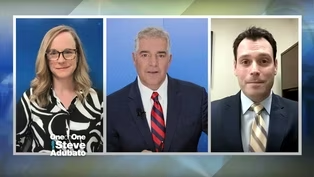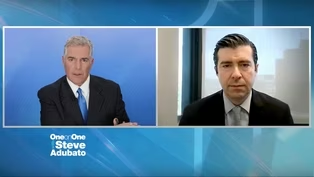One-on-One
This Organization Is Empowering Survivors of Domestic Abuse
Clip: Season 2024 Episode 2735 | 10m 7sVideo has Closed Captions
This Organization Is Empowering Survivors of Domestic Abuse
As part of our "Making A Difference" special series, Steve Adubato is joined by Karimah Hagans, Esq., Executive Director of Turning Point Community Services, to examine their support initiatives which are aimed to empower survivors of domestic violence.
Problems playing video? | Closed Captioning Feedback
Problems playing video? | Closed Captioning Feedback
One-on-One is a local public television program presented by NJ PBS
One-on-One
This Organization Is Empowering Survivors of Domestic Abuse
Clip: Season 2024 Episode 2735 | 10m 7sVideo has Closed Captions
As part of our "Making A Difference" special series, Steve Adubato is joined by Karimah Hagans, Esq., Executive Director of Turning Point Community Services, to examine their support initiatives which are aimed to empower survivors of domestic violence.
Problems playing video? | Closed Captioning Feedback
How to Watch One-on-One
One-on-One is available to stream on pbs.org and the free PBS App, available on iPhone, Apple TV, Android TV, Android smartphones, Amazon Fire TV, Amazon Fire Tablet, Roku, Samsung Smart TV, and Vizio.
Providing Support for PBS.org
Learn Moreabout PBS online sponsorship(upbeat music) - We're now joined by Karimah Hagans, Executive Director of Turning Point Community Services.
Karimah, great to meet you.
- Likewise, honored to be here, Steve.
- You got it.
We'll put up the website of Turning Point.
Tell everyone what the organization is, and the impact you are having.
- Yes, so Turning Point Community Services is a nonprofit organization that provides housing and supportive services to women and children who are unhoused or homeless and survivors of abuse.
We service Essex, Hudson, and Union County families, and we own and operate the only family shelter in Irvington, where we house about up to 70 individuals at any given time.
- There's a real connection between domestic violence and homelessness.
Explain that.
- Absolutely.
Well, it's no shocker when it comes to women there are so many reasons why they may be unhoused, or displaced when it comes to DV.
It's one of the leading causes of homelessness for women is the fact that they're fleeing and they're trying to figure out a way how to become stable.
And when you're involved in DV, sometimes you don't have access to funding.
Sometimes you don't have those resources because you're in that situation so you just try to flee.
And that's why a lot of women, you know, unfortunately, who are survivors do end up unhoused and displaced.
- Let's talk about the situation out in Oregon, okay?
- Yes.
- So we're taping this for the back end of May.
It'll be seen later, so I'm not really sure how it's gonna play out in the United States Supreme Court, the Oregon versus Johnson case.
The community is Grants Pass, Oregon, if I've not mistaken.
- Yes.
- What is the issue and what is the potential, what are the potential implications of criminalizing homelessness?
Which in the eyes of many, that's exactly what this case is about.
If I'm not mistaken, there are people in this community in Oregon who want to make being homeless a criminal act.
- Right, exactly what you said, the criminalization of homelessness.
Because they have no place to go that idea that they should be fined, or even given jail time for being unhoused, and as you said it, arguments were heard in April, so a decision was still pending.
It's unfortunate and I think is, I don't know how we kind of lost humanity, because that's not the answer.
That's not gonna solve the homelessness crisis to be able to fine them 'cause they can't afford those fines.
And it puts us in a situation of how we are identifying status versus conduct, right?
That they're being criminalized for their status of being unhoused, not for actually committing a criminal act.
- But at the same time, Karimah, let me ask you this.
I'm sorry for interrupting.
To what degree do you have any degree of empathy and understanding of people who say, you know what, this is our community.
We wanna keep our streets safe and clean, et cetera.
And having people who are homeless living on the streets, negatively impacts the quality of our life, life in our community.
Do you relate to that at all?
- Certainly, so personally-driven.
- Because that's what they're saying.
That's what their argument is.
- Right.
So there's ways to go about it.
That's not the solution, honestly.
Housing and services is how we go about it.
Being able to give them the support that they need to tackle the underlying cause of their homelessness, right?
Housing New Jersey is a housing first approach, which I do agree with, conduct with services could really help them no longer be homeless, which then in turn- - What kind of services, Karimah, sorry, again, what kind of service?
Be specific, because some people have the attitude, and listen, I'm not being critical, it's a fact.
I don't wanna see it.
I don't want it anywhere around.
That's not a solution.
That's just what some people feel and think.
What kind of services specifically are we talking about that you and your colleagues provide every day making a difference for people who are struggling?
- Absolutely.
We have our mental health services, so our clinical, where we provide individual and family counseling and therapy.
We were actually funded through a healthcare foundation to help us pilot and launch that program.
Services like life skills and education workshops, talking about GED preparation, financial literacy, nutrition, case management, to help connect them with resources, external and internal in our organization.
And my favorite, continued support, which I think is very important that people don't think to do.
And it's my favorite because it came about with one of our residents.
When we were able to place her and house her into her own affordable housing unit, she was still coming to our facility and we were sitting back and trying to figure out, why are you here?
We love to see you, but why are you here?
And it dawned on us that she needed help.
She still needed help.
So even once they're placed, we can't just wipe our hands clean.
We have to continue to provide our case management support, continue to provide that mental health support and those additional services, again, to help them break the underlying causes of their homelessness.
- It's so easy for people to say, I don't wanna see it, let's criminalize homeless, but the solution, or the solutions, the remedies, the things that make things better, it's, like, in the weeds, it's details, it's programs, there's no quick fix.
Nevermind, I'll get off my soapbox.
So let me ask you this, your personal story and I'm sorry for using that word story.
Your personal experience matters here.
Please talk about it.
- Absolutely.
I am a daughter and a granddaughter of domestic violence survivors.
My mother is a single parent.
So growing up I grew up in this environment and I'm very fortunate for my mom.
And, you know, no two families are the same.
No two situations are the same, but we heavily relied on the community to help us get through and get by.
And I always knew that I wanted to give back to the community.
So for me, it was become a lawyer, right?
When I was young.
I thought that was the way to go become a lawyer, help those and in turn in that journey, I've really afforded the opportunity to give back to the community in a way that I think really does the most impact on a daily basis, so.
My story is I'm just here to help those who once helped me and my mom.
- It's highly personal for you, isn't it?
- Absolutely, yeah, I love what I do.
The programs that we create and the way we go about it really kind of develops from, hmm, I remember that time when I was younger, or I remember what my mom needed during this time, so obviously, so do our families need that same support.
So we developed those programs in that way.
- Before I let you go, I'm curious about this.
I know you write grants for the organization.
A lot of what you put into those grants, beyond the metrics and the things that people wanna understand, to what degree is your personal experience and your passion communicated in those grants to foundations and others whose support you need?
- A lot of it.
I think when I write these grants, it's this idea of I know what we need.
I know what we need from a personal experience.
I know what we need from what I see every day when we're in our shelters and working with our moms and sitting with our moms, so it allows us to share that story in the best way because those who receive those applications, they're not there.
So it's my job to really illustrate the need in a way that allows them to award us these funds so that we could do the work that is needed.
So I put all my heart and soul into our grants.
Again, we're fighting so many nonprofit organizations who are doing great work as well.
So we have to make sure we stand out.
And I think my personal journey, and, again, the stories of those that we serve really help us do that.
- Karimah Hagans is Executive Director of a terrific organization making a difference every day, Turning Point Community Services.
Karimah, wish you and your team all the best in the important work you're doing.
Thank you.
- Thank you so much.
- I'm Steve Adubato.
Thank you so much for joining us.
We'll see you next time.
- [Narrator] One-On-One with Steve Adubato is a production of the Caucus Educational Corporation.
Celebrating 30 years in public broadcasting.
Funding has been provided by The Healthcare Foundation of New Jersey.
The Turrell Fund, a foundation serving children.
Rowan University.
Citizens Philanthropic Foundation.
PSE&G, Johnson & Johnson.
NJM Insurance Group.
Horizon Blue Cross Blue Shield of New Jersey.
And by The Port Authority of New York and New Jersey.
Promotional support provided by CIANJ, and Commerce Magazine.
And by NJBIZ.
- NJM Insurance Group has been serving New Jersey businesses for over a century.
As part of the Garden State, we help companies keep their vehicles on the road, employees on the job and projects on track, working to protect employees from illness and injury, to keep goods and services moving across the state.
We're proud to be part of New Jersey.
NJM, we've got New Jersey covered.
How The Kessler Foundation is Improving Patient Care
Video has Closed Captions
Clip: S2024 Ep2735 | 8m 10s | How The Kessler Foundation is Improving Patient Care (8m 10s)
NJEDA CEO Examines The Booming Film Industry in New Jersey
Video has Closed Captions
Clip: S2024 Ep2735 | 9m 34s | NJEDA CEO Examines The Booming Film Industry in New Jersey (9m 34s)
Providing Support for PBS.org
Learn Moreabout PBS online sponsorship
- News and Public Affairs

Top journalists deliver compelling original analysis of the hour's headlines.

- News and Public Affairs

FRONTLINE is investigative journalism that questions, explains and changes our world.












Support for PBS provided by:
One-on-One is a local public television program presented by NJ PBS

